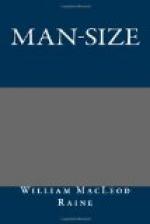Stearns and Morse rode toward the fort. They deflected from the road and followed the river-bank to take advantage of such shrubbery as grew there. They moved slowly and cautiously, for in the Indian country one took no unnecessary chances. From the top of a small rise, shielded by a clump of willows, the two looked down on a field of battle already decided. Bullets and arrows were still flying, but the defiant, triumphant war-whoops of a band of painted warriors slowly moving toward them showed that the day was won and lost. A smaller group of Indians was retreating toward the swamp on the left-hand side of the road. Two or three dead braves lay in the grassy swale between the foes.
“I done guessed it, first crack,” Brad said. “Crees and Blackfeet. They sure enough do mix it whenever they get together. The Crees ce’tainly got the jump on ’em this time.”
It was an old story. From the northern woods the Crees had come down to trade at the fort. They had met a band of Blackfeet who had traveled up from the plains for the same purpose. Filled with bad liquor, the hereditary enemies had as usual adjourned to the ground outside for a settlement while the traders at the fort had locked the gates and watched the battle from the loopholes of the stockade.
“Reckon we better blow back to camp,” suggested the old plainsman. “Mr. Cree may be feelin’ his oats heap much. White man look all same Blackfeet to him like as not.”
“Look.” Morse pointed to a dip in the swale.
An Indian was limping through the brush, taking advantage of such cover as he could find. He was wounded. His leg dragged and he moved with difficulty.
“He’ll be a good Injun mighty soon,” Stearns said, rubbing his bald head as it shone in the sun. “Not a chance in the world for him. They’ll git him soon as they reach the coulee. See. They’re stoppin’ to collect that other fellow’s scalp.”
At a glance Morse had seen the situation. This was none of his affair. It was tacitly understood that the traders should not interfere in the intertribal quarrels of the natives. But old Brad’s words, “good Injun,” had carried him back to a picture of a brown, slim girl flashing indignation because Americans treated her race as though only dead Indians were good ones. He could never tell afterward what was the rational spring of his impulse.
At the touch of the rein laid flat against its neck, the cow-pony he rode laid back its ears, turned like a streak of light, and leaped to a hand gallop. It swept down the slope and along the draw, gathering speed with every jump.
The rider let out a “Hi-yi-yi” to attract the attention of the wounded brave. Simultaneously the limping fugitive and the Crees caught sight of the flying horseman who had obtruded himself into the fire zone.
An arrow whistled past Morse. He saw a bullet throw up a spurt of dirt beneath the belly of his horse. The Crees were close to their quarry. They closed in with a run. Tom knew it would be a near thing. He slackened speed slightly and freed a foot from the stirrup, stiffening it to carry weight.




